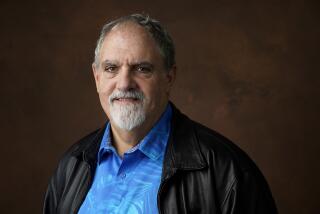Review: Tom Cruise flies high — again — in the exhilarating ‘Top Gun: Maverick’

“If you think, you’re dead.” That’s one of Tom Cruise’s more memorable lines from “Top Gun,” a cautionary reminder that when your engine flames out or an enemy pilot locks you in their sights, hesitation means death. Inadvertently, the line also suggests the best way to enjoy Tony Scott’s immortal 1986 blockbuster: Best not to think too long or hard about the dumb plot, the threadbare romance, the fetishization of U.S. military might or the de rigueur plausibility issues. The key is to succumb, like Cruise’s high-flying Maverick himself, to a world of unchecked instinct and pure sensation, to savor the movie’s symphony of screaming jets and booming Giorgio Moroder, not to mention all those lovingly photographed torsos and tighty-whities.
Jets still scream and muscles still gleam in the ridiculous and often ridiculously entertaining “Top Gun: Maverick,” though in several respects, the movie evinces — and rewards — an unusual investment of brainpower. I’d go further and say that it offers its own decisive reversal of Maverick’s dubious logic: It has plenty on its mind, and it’s gloriously alive.
For your safety
The Times is committed to reviewing theatrical film releases during the COVID-19 pandemic. Because moviegoing carries risks during this time, we remind readers to follow health and safety guidelines as outlined by the CDC and local health officials.
A lot of consideration and calculation have clearly gone into this long-aborning blockbuster sequel, insofar as Cruise (one of the producers) and his collaborators have taken such clear pains to maintain continuity with the events, if not the style, of the first film. That’s no small thing, more than 30 years after the fiery young Maverick lost Goose, made peace with Iceman and rode off into the annals of fictional U.S. Navy history. And rather than let bygones be bygones, the director Joseph Kosinski and a trio of screenwriters (Ehren Kruger, Eric Warren Singer and Cruise’s favorite auteur-wingman, Christopher McQuarrie) have resurrected those threads of rivalry, tragedy and triumph and spun them into uncharted realms of male-weepie grandiosity.
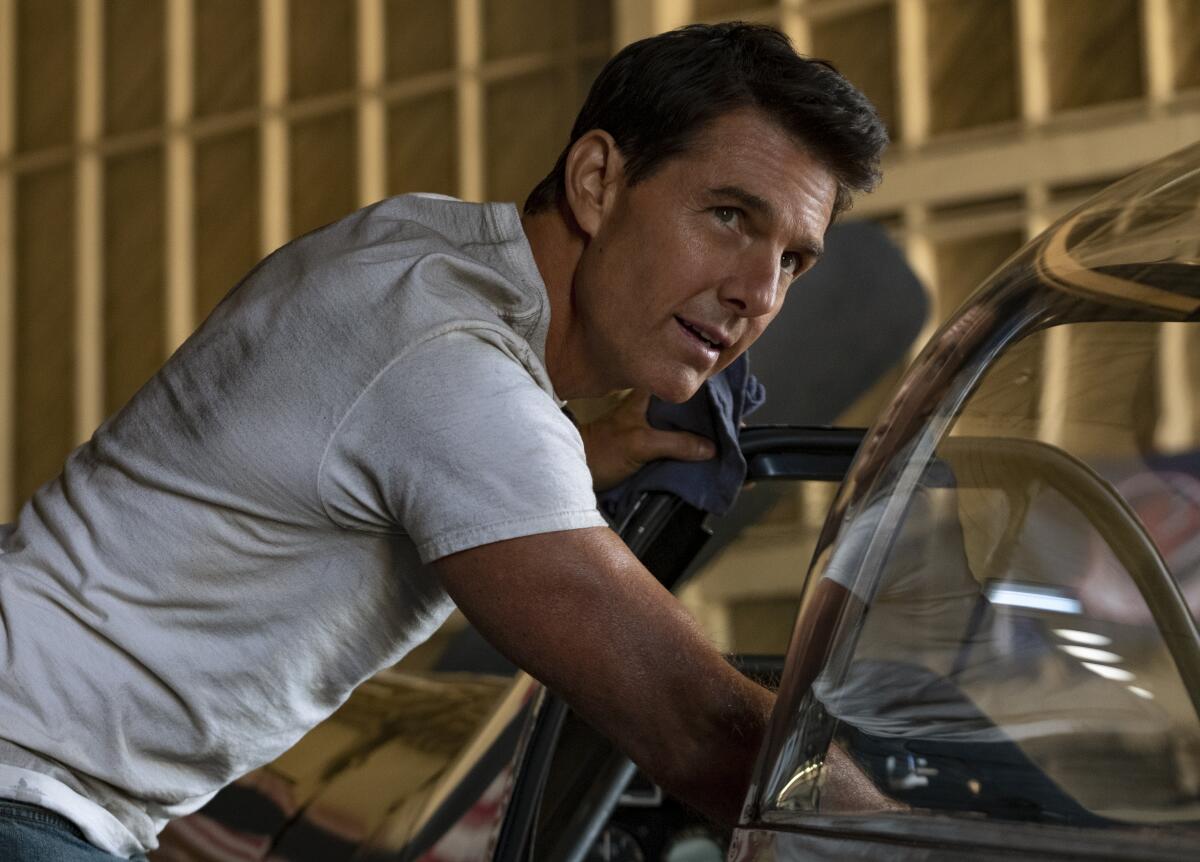
Some of this continuity is a matter of basic story sense, rooted in a shrewd understanding of franchise mechanics and an equally savvy appeal to ’80s nostalgia. But it also has something to do with the 59-year-old Cruise’s close stewardship of his own superhuman image, a commitment that speaks to his talent as well as his monomania. And with the arguable exception of “Mission: Impossible’s” Ethan Hunt, few Cruise characters have felt as aligned with that monomania as Maverick. From the moment he entered the frame in ’86, sporting flippant aviator shades and riding a Kawasaki motorcycle, Pete “Maverick” Mitchell announced himself as a signature Cruise creation — a precision-tooled amalgam of underwear-dancing sex symbol (just three years after “Risky Business”) and the envelope-pushing, heights-scaling action star he would become.
These days, the need for speed still persists for both Cruise and Maverick, even if the latter does more flying than running. But for all the barriers he’s broken and all the miles he’s logged in his career as a Navy test pilot, Maverick occupies a state of self-willed professional stasis. Unwilling to be promoted into desk-job irrelevancy, he is a captain by rank and a rebel by nature. The opening sequence finds him playing Icarus with one of the Navy’s shiny new toys, thumbing his nose in the process at the first of the movie’s two glowering authoritarians. (They’re played by Ed Harris and Jon Hamm.) Old habits die hard, but so do the ghosts of the past, and Maverick, for all his reckless abandon in the cockpit, will soon find himself breaking his own rules by thinking more carefully, and tactically, than he’s ever had to do before.
Called back to the elite Navy training school where he flew planes, defied orders and irritated his peers with distinction, Maverick is charged with preparing the program’s best and brightest for a stealth attack on a far-flung uranium enrichment plant owned by some conveniently unidentified NATO-threatening entity. As impossible missions go, it makes the Death Star trench attack look like a grocery run — a tough assignment for Maverick’s 12 brilliant but still-untested pilots, played by actors including Lewis Pullman, Jay Ellis, Danny Ramirez and a terrific Glen Powell as a smug, know-it-all Iceman type. And then there’s the hotheaded Rooster (Miles Teller, sullen as only he can be), whose candidacy is complicated by the fact that his late father was Maverick’s wingman and best friend, Goose (the great Anthony Edwards, seen here in brief shards of footage from the first “Top Gun”). Talk about chickens coming home to roost.
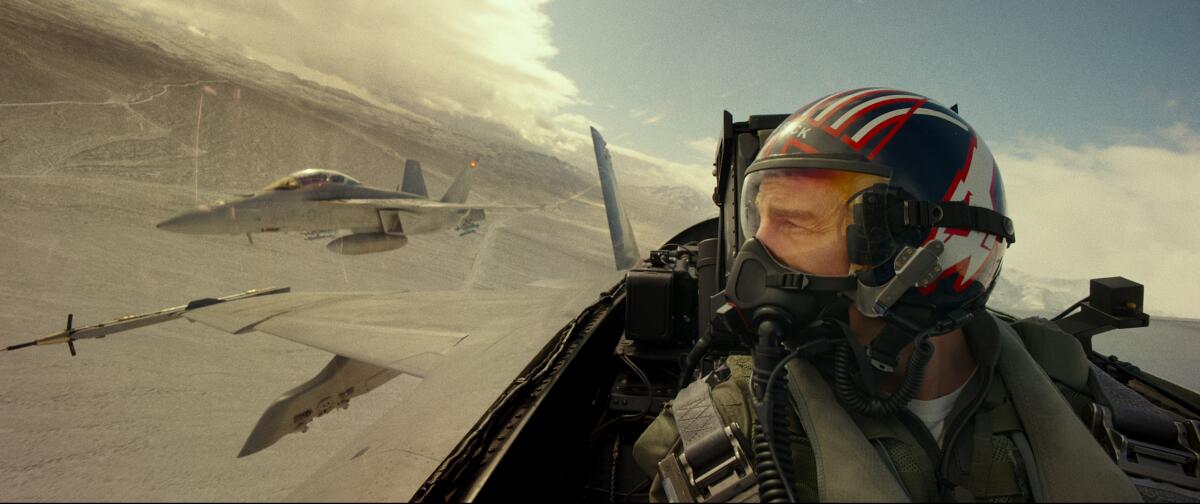
Rooster’s background is a ludicrous contrivance. It’s also the perfect setup for the kind of rich, thorny cross-generational soap opera that — as much as its aspect-ratio-fluctuating flight sequences and its climactic surge of Lady Gaga — is this movie’s reason for being. Those planes may be powered by fuel, but “Top Gun: Maverick” runs on pure, unfiltered dad energy. Try not to smile whenever Cruise’s Maverick flashes a mischievous avuncular grin beneath his helmet and chases his young charges in F/A-18s all over the Mojave Desert, teaching them new moves while wasting no chance to reassert his own superiority. Back on the ground, Maverick and Rooster’s surrogate daddy-son tensions flare into the open, exacerbated by guilt, resentment and their recognition of their shared stubbornness.
The drama might have taken on an intriguingly Oedipal edge if the filmmakers had thought to bring back, say, Meg Ryan as Carole, Goose’s wife and Rooster’s mother. But here, with the exception of Monica Barbaro as one of Maverick’s most gifted proteges, women are few and far between, and even the more prominent ones get mostly perfunctory treatment. With no sign of Kelly McGillis as the Navy instructor who once took Maverick’s breath away, it falls to another flame, Penny (a lovely, underused Jennifer Connelly), to mix a few drinks, provide a flicker of romantic distraction and snuff out the first film’s lingering homoerotic vibes. Not that there are many such whiffs here, and more’s the pity: Kosinski, who previously directed Cruise in the shiny, empty science-fiction drama “Oblivion,” is a skilled craftsman with none of Scott’s horned-up filmmaking energy. (He does salute the original with an opening blast of “Danger Zone” and a rousing game of football in the surf, though the latter is more team-building than steam-building exercise.)
Scott’s admirers may miss that disreputable edge, the unrepentantly vulgar sensibility that made the original “Top Gun” a dreamy, voluptuous hoot. There’s some compensation in Kosinski’s fight and flight sequences, full of face-melting ascents, whiplash-inducing loop-de-loops and other airborne stunts that prove considerably more transporting and immersive than what the first “Top Gun” was able to accomplish. That’s only to be expected, given the more sophisticated hardware involved. Like any proper commercial for the military-industrial complex, “Top Gun: Maverick” teases the latest cutting-edge advances in aeronautics and defense technology, a field that has evolved roughly in step with an ever more digitally subsumed movie industry.
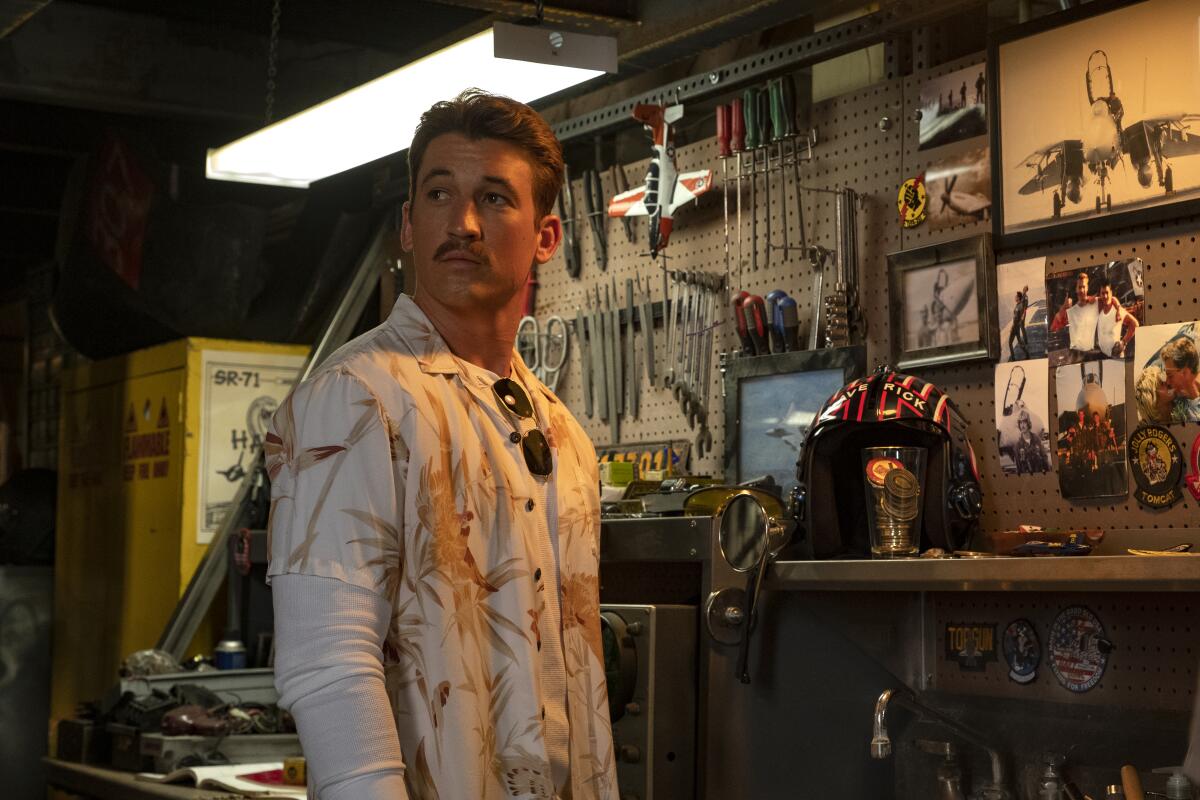
At the same time, thanks to Cruise and Kosinski’s unfashionable insistence on practical filmmaking and their refusal to lean too heavily on computer-generated visual effects, their sequel plays like a throwback in more than one sense. But the era that produced the first film has shifted, and “Top Gun: Maverick” is especially poignant in the ways, both subtle and overt, that it acknowledges the passage of time, the fading of youth and the shifting of its own status as a pop cultural phenomenon. The original was a risky, relatively low-budget underdog that somehow became a perfectly imperfect movie for its moment, soaring on the wings of its dreamy eroticism and recruitment-commercial aesthetics, a mega-hit soundtrack and an incandescent star. It ushered in a new era of decadence for its producers, Don Simpson and Jerry Bruckheimer, and for the many gung-ho American blockbusters they would keep cranking out.
“Top Gun: Maverick” is a longer, costlier and appreciably weightier affair, and its expanded emotional scope and heightened production values (including a score by the original film’s composer, Harold Faltermeyer) give it a classy, elegiac sheen; it’s like a hot summer diversion in prestige-dinosaur drag, or vice versa. As a rare big-budget Hollywood movie about men and women who fly without capes, it has a lot riding on it. Once set for a summer 2020 release but delayed almost two years by the pandemic, it arrives bearing the hopes and dreams of a tentatively resurgent industry that could use a non-Marvel theatrical hit. And as such, everything about its story — from the intergenerational conflict to the high stakes of Maverick’s mission to the rusted-out F-14s collecting dust at the periphery of the action — carries an unmistakable subtext. Is this movie one of the last gasps of a dying Hollywood empire? Or is its emotionally stirring, viscerally gripping and proudly old-fashioned storytelling the latest adrenaline shot that the industry so desperately needs?
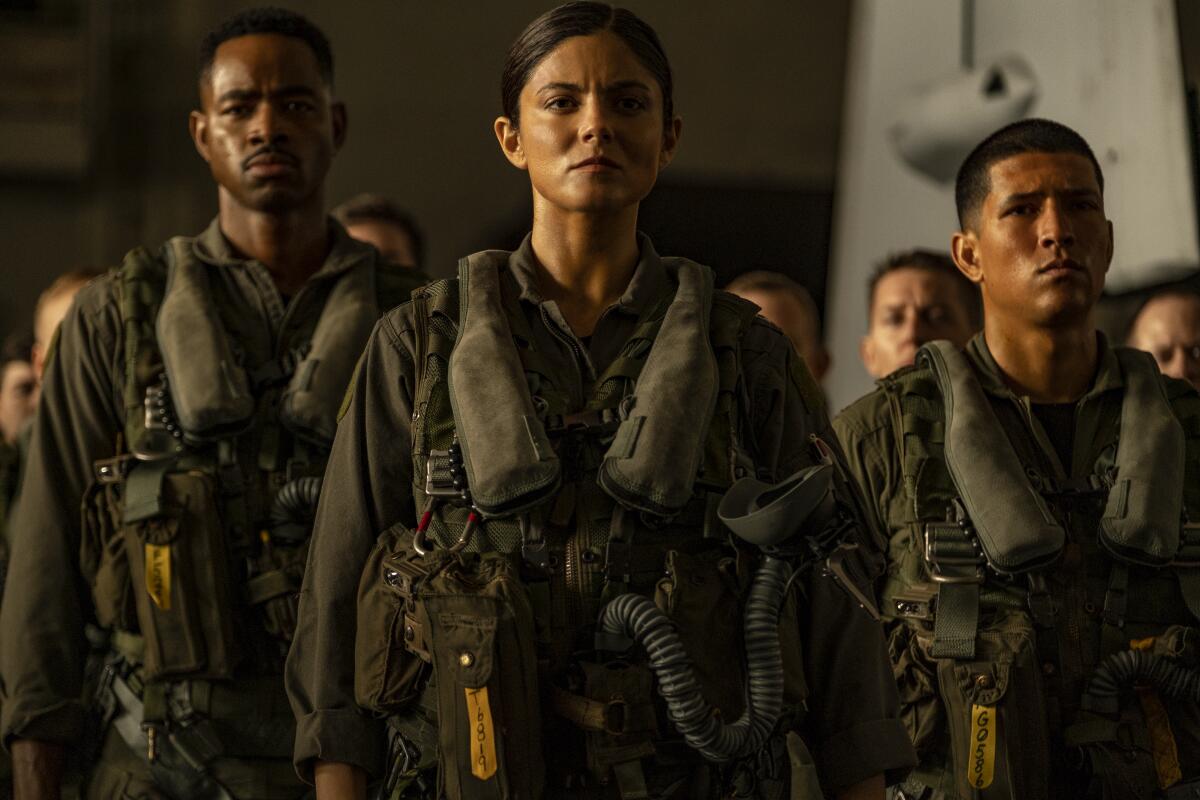
It’s hard to consider any of this apart from Cruise, whose attention-grabbing actions during an earlier phase of the pandemic — shooting a video of himself going to see “Tenet” in a packed London theater, verbally lashing members of his “Mission: Impossible” crew for flouting COVID-19 protocols — suggest a man who’s placed the weight of an entire troubled industry on his own shoulders. His endless search for the perfect action vehicle has sometimes felt like a quest for some elusive fountain of Hollywood youth, and it’s led to gratifying highs (“Edge of Tomorrow”) and inexplicable lows (“The Mummy”). Like Maverick, to whom someone wise once said, “Son, your ego is writing checks that your body can’t cash,” Cruise just won’t quit, won’t give up, won’t listen to anyone who tells him no. As a sometime fan of Cruise’s egomania, at least when he’s dangling from a helicopter or literally running to catch a plane, I’m not really complaining.
And so there’s some irony and maybe even a hint of self-awareness in the fact that while Cruise owns just about every moment of this movie, another star winds up stealing it. As Iceman, Maverick’s old adversary turned wingman, mentor and ally, Val Kilmer haunts “Top Gun: Maverick” from its earliest moments but enters it surprisingly late, anchoring a perfectly timed, beautifully played scene that kicks the movie into emotional overdrive. Watching Ice as he greets and counsels Maverick, you may find yourself thinking about the actor playing him, about the recent toll on his health and the rickety trajectory of his own post-’80s and ’90s career, subjects that were illuminated by the recent documentary “Val.” In one fictional moment, he gives us something unmistakably, irreducibly real, partly by puncturing the fantasy of human invincibility that his co-star has never stopped trying to sell.
‘Top Gun: Maverick’
Rated: PG-13, for sequences of intense action, and some strong language
Running time: 2 hours, 17 minutes
Playing: Starts May 27 in general release
More to Read
Only good movies
Get the Indie Focus newsletter, Mark Olsen's weekly guide to the world of cinema.
You may occasionally receive promotional content from the Los Angeles Times.

